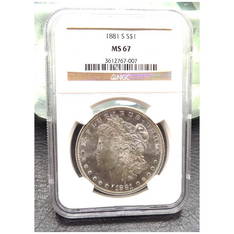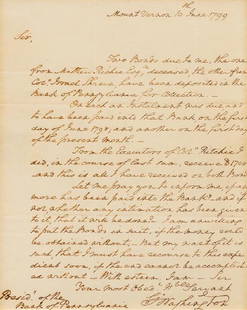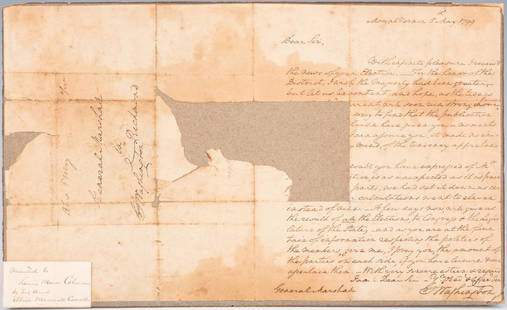
60152: George Washington letter signed ("Go: Washington
Similar Sale History
Recommended Items








Item Details
Description
George Washington letter signed ("Go: Washington"). Three pages of a bifolium, 9" x 14.5", "Head Quarters, Morris Town" [New Jersey]; March 15, 1777. Docketed. General Washington communicates orders to McDougall concerning enlistments and troop movements. A lengthy letter, in the hand of Alexander Hamilton (1755 or 1757-1804), a senior aide to Washington for part of the Revolutionary War, to Brigadier General Alexander McDougall, at Fishkill, New York, concerning troop movements, enlistments, and other military matters. It reads, in full: "Dear Sir I this evening received the favour of your letter of the 12th instant. The order you gave for such part of Ganservorts regiment as was at Fish-kills to repair to Fort Constitution, I approve of, as also you[r] determination respecting DuBois's to remain at Fort Montgomery. They may be drawn from these places, when requisite, with the same expedition and ease as from Peeks-kills. The meaning and spirit of my order was, that the troops should be so assembled, as to be ready to act upon the shortest notice, in cases of emergency. However I hope that the Convention will fall upon speedy and effectual measures for garrisoning the above posts, and that those regiments should not be relied on for the purpose. If the Gallies can be serviceable in the way you mention, they ought to be equipped; but I cannot, nor ever will again break in upon the regiments, appointed for the land service to man them. I have seen and felt the disadvantages arising from reducing Corps by drafts. I should think the Convention had better take the matter up, and proceed in such way as they judge best adapted to the end, or agreeable to such directions as the Marine Committee may give, after 'tis referred to them. It is much to be wished the States could make up their quota's [sic] of men by voluntary inlistments, rather than in any other way; but if it cannot be done, in any reasonable time, they must try some other expedient. If it can be effected by that you mention, it is of importance, that it should be immediately adopted. Our situation is critical, and the filling the regiments should not meet with the least avoidable delay. Securing the Magazines of Hay &ca mentioned by Mr Sacket, is certainly an object of much importance; but I cannot by any means consent that Colonel Livingston's regiment should be stationed at West-Chester-County for that purpose. The present State of things will not admit of having the Continental troops placed where they cannot be readily drawn to those places, in which there is a high probability of their being more essentially wanted. Neither is perhaps the danger so great as seems to be apprehended of inroads from the enemy that way—They have drawn almost the whole of their force into this state, and have left so few behind, that it is extremely probable they will be content, if they remain free from annoyance themselves without risking the consequences of any offensive attempts. Yet it will be altogether expedient as far as the situation of affairs will permit to guard against the exploits of a partisan. But I am under the necessity of leaving the matter to the committee of Convention, under whose management it has been hitherto conducted, to have the magazines remov[ed] to some place of greater security, which I hope they will be able to effect. I do not find any mention of innoculation in your letter. This is an object of great importance, and what I wished to claim your first attention. The Campaign will soon be opened, and if it has not been begun, I fear the troops cannot be carried through the disorder so soon as will be necessary; but as it is so material a point, I must repeat my request that it may not be delayed a moment longer. The part you have taken respecting Mr Edmiston I think perfectly prudent; but however upright his intentions may in reality be, he has left great room to suspect some unfair procedure. The time limited in his parole for his return has been now three weeks elapsed; and his not coming out before he did, is certainly an infringement of it, and merits reprehension. The proposal for his being permitted to go to Canada appears to me to be stamped with no great degree of modesty; and to carry in the face of it an insidious design to make him the vehicle of some important instructions to the enemy there. I shall write to General Schuyler on the subject. I have given orders to the State of Massachusetts to send eight of their regiments to Peeks-Kills. You will see that every necessary preparation is made for their reception; and as I have directed that such as are clothed and armed may be immediately sent on and pass through innoculation there, I must beg you[r] particular attention to the forwarding this purpose. On a second view of the matter, I have no great objection that Colonel Livingston's regiment should be sent to West-Chester for a little time' till the Convention, by exerting themselves, may be able to call out the Militia to supply its place. But I cannot admit the idea of its being stationary there,' till the business is done, as seems to b[e] desired. I consent to its going as a temporary expedient for an immediate exigency, but on no other ground; and this I would do with the greater readiness, if it could be so situated, as to be in the way of obeying a su[dden] call to this Quarter. Urge the Committee to dispatch the removal of the Magazines to some safe and convenient place. It was utterly impolitic, and ever against my judgment, to begin them, where they now are. I am with great respect, Dear Sir Your most obedient servant Go: Washington" Washington responds to Brigadier General Alexander McDougall's letter of March 12, 1777. In his letter to Washington, McDougall had informed the general that he ordered a New York regiment under Colonel Peter Gansevoort (1749-1812) from Peekskill to relieve the garrison at Fort Constitution (later known as Fort Lee, located on the New Jersey side of the lower Hudson River), in order to give British forces in New York City the impression that the garrison was fortified and to have troops available to cross the Hudson when necessary. In doing so, McDougall decided to leave another New York regiment under Colonel Lewis DuBois (1744-1824) at Fort Montgomery. In his letter of March 12, McDougall asked Washington for his opinion of his actions. In this letter offered here, Washington approves of McDougall's decisions concerning the forts and, referring to his letter to McDougall of March 6, 1777, stated that his request to have all soldiers in a state of readiness in case of emergency was due to his concern for the low number of soldiers due to the end of enlistments. He expresses his hopes to McDougall that the Convention of Representatives of the State of New York (also known as the 4th Provincial Congress of New York) will quickly send new recruits and not rely solely on McDougall's depleted ranks. In his March 12 letter to Washington, McDougall urged that galleys be equipped and ready for service in order to prevent British small craft from interfering with American ships. In this letter, Washington responds to McDougall's idea in principle, but makes it clear that he does not favor using soldiers to serve on them since such a practice would only reduce his already low troop levels. He suggests to McDougall that the Convention of Representatives take up the matter. Washington then addresses with McDougall his profound concerns about raising new recruits to replace troop losses due to the end of enlistments and desertions. He expresses his hope that the states will make their quotas through voluntary enlistments rather than through enticements, such as bounties. Still, his need for new recruits is such that he's open to getting replacements by other means if necessary, such as drafting men from the militia using bounties, as suggested by McDougall. McDougall, in his March 12 letter to Washington, enclosed a letter from Nathaniel Sackett, representing a committee of the Convention of Representatives, requesting that Colonel Henry Beekman Livingston (1750-1831) and his regiment be stationed at West Chester County. In this letter to McDougall, Washington at first disagrees with the request because that area is not in danger of attack and he needs the regiment elsewhere. But later in the letter, he changes his mind and agrees to send Livingston's regiment to West Chester temporarily until the Convention can supply troops from the militia to fill the need. In this letter, Washington expresses surprise that McDougall did not mention the subject of inoculation. This was a critical issue for Washington since smallpox had broken out among American forces in the South. In a February 10 letter to the New York Convention, he mentioned that every attempt was being made to stop the disease's progress, since there was little possibility of saving the lives of those who had yet to contract it unless inoculation was pursued. Washington had urged each state to inoculate recruits who had not yet contracted the disorder. In this letter, he urges McDougall to do the same as soon as possible. Finally, Washington addresses an issue that McDougall raised in his March 12 letter, that is a February 18 letter written by General William Howe (1729-1814), Commander of British forces in America, to American Major General Philip Schuyler (1733-1804), in which the British general offers a proposal to exchange an American officer prisoner in return for allowing British Major Archibald Edmonstone to travel to Canada. Washington believes Edmonstone's trip to Canada is a British scheme to share intelligence and instructions with British forces there. He informs McDougall he will take up the matter with General Schuyler. When Washington wrote this letter to McDougall, he had established his headquarters in Morristown, New Jersey. After significant American morale-boosting victories over the British at Trenton (December 26, 1776) and Princeton, New Jersey (January 23, 1777), Washington marched north to Morristown, where he set up winter headquarters for himself and the Continental Army on January 6, 1777. The hills surrounding the camp provided a perfect vantage point for Washington to spy on the British army located in New York City. It was also positioned strategically to allow the Americans to monitor the roads used by the British troops. Alexander Hamilton, future signer of the U.S. Constitution and first Secretary of the Treasury, served as captain of the New York Provincial Company of Artillery of 60 men in the American Revolution before he was invited to serve as Washington's chief staff aide with the rank of lieutenant colonel. Hamilton's company took part in the campaign of 1776 around New York City, notably at the Battle of White Plains; and later at the Battle of Trenton and Princeton. Hamilton served as Washington's aide from early 1777 to March 1781. A detailed letter that highlights Washington's leadership skills as he handled several issues during the critical winter of 1777. The letter is accompanied by an engraved portrait of Washington by A. B. Durand, an engraved hand-colored portrait of Alexander Hamilton, and an engraved hand-colored portrait titled "First Meeting of Washington & Hamilton," by Thomas Phillibrown. Condition: Separated along integral fold. Moderate edgewear with .5" closed tear along right edge of first sheet. Light scattered soiling and foxing.
HID03101062020
© 2022 Heritage Auctions | All Rights Reserved
Condition
Buyer's Premium per Lot:
25% on the first $300,000 (minimum $49), plus 20% of any amount between $300,001 and $3,000,000, plus 15% of any amount over $3,000,001 per lot.
25% on the first $300,000 (minimum $49), plus 20% of any amount between $300,001 and $3,000,000, plus 15% of any amount over $3,000,001 per lot.
Buyer's Premium
- 25% up to $300,000.00
- 20% up to $3,000,000.00
- 15% above $3,000,000.00
60152: George Washington letter signed ("Go: Washington
Estimate $48,000 - $72,000
6 bidders are watching this item.
Shipping & Pickup Options
Item located in Dallas, TX, usSee Policy for Shipping
Payment

Auction Curated By

Director Historical Manuscripts
Related Searches
TOP




















![60150: George Washington letter signed ("Go: Washington: George Washington letter signed ("Go: Washington"). One page of a bifolium, 9" x 14.25", "Head Quarters, Morris Town" [New Jersey]; Mar](https://p1.liveauctioneers.com/906/251093/130472672_1_x.jpg?height=310&quality=70&version=1654636517)

![60156: George Washington letter signed ("Go: Washington: George Washington letter signed ("Go: Washington"). One page of a bifolium, 8.25" x 13.5", "Head Quarters White Plains" [New York]; Se](https://p1.liveauctioneers.com/906/251093/130472801_1_x.jpg?height=310&quality=70&version=1654636517)
![60157: George Washington letter signed ("Go: Washington: George Washington letter signed ("Go: Washington"). One page, 8.5" x 13.5", "Head Quarters, Fish Kill" [New York]; October 8&com](https://p1.liveauctioneers.com/906/251093/130472803_1_x.jpg?height=310&quality=70&version=1654636517)

![60148: George Washington letter signed ("Go: Washington: George Washington letter signed ("Go: Washington"). One page of a bifolium, 9" x 14.5", "Head Qrs, Morristown" [New Jersey]; February 9](https://p1.liveauctioneers.com/906/251093/130472486_1_x.jpg?height=310&quality=70&version=1654636517)
![60151: George Washington letter signed ("Go: Washington: George Washington letter signed ("Go: Washington"). One page of a bifolium, 8.25" x 13", "Head Qrs, Morristown" [New Jersey]; March 15&](https://p1.liveauctioneers.com/906/251093/130472714_1_x.jpg?height=310&quality=70&version=1654636517)
![60149: George Washington letter signed ("Go: Washington: George Washington letter signed ("Go: Washington"). Three pages of a bifolium, 8.25" x 13", "Head Quarters, Morristown" [New Jersey]; F](https://p1.liveauctioneers.com/906/251093/130472594_1_x.jpg?height=310&quality=70&version=1654636517)







![An autograph letter from Washington's first year as President: WASHINGTON, GEORGE Autograph letter signed as President. [New York:] 10 August 1789. A short one page autograph note signed "Go:Washington", the note regarding a meeting time, small numeral "107" in a](https://p1.liveauctioneers.com/292/326828/175963004_1_x.jpg?height=310&quality=70&version=1713473479)

![A Dwight D. Eisenhower signed letter as President: [PRESIDENTS] EISENHOWER, DWIGHT D. Typed letter signed as President. Washington: 7 October 1958. A one page typed letter signed on White House stationery. The letter accepting the resignation of the H](https://p1.liveauctioneers.com/292/326828/175963030_1_x.jpg?height=310&quality=70&version=1713473479)











![George Washington Signed Discharge: Partly printed discharge document signed by George Washington, as Commander in Chief of the Armies of the United States. Newburgh, [New York], 4 January 1783. 1 page, ## x ## in. Undersigned by Washin](https://p1.liveauctioneers.com/7226/322253/173251475_1_x.jpg?height=310&quality=70&version=1710004847)
